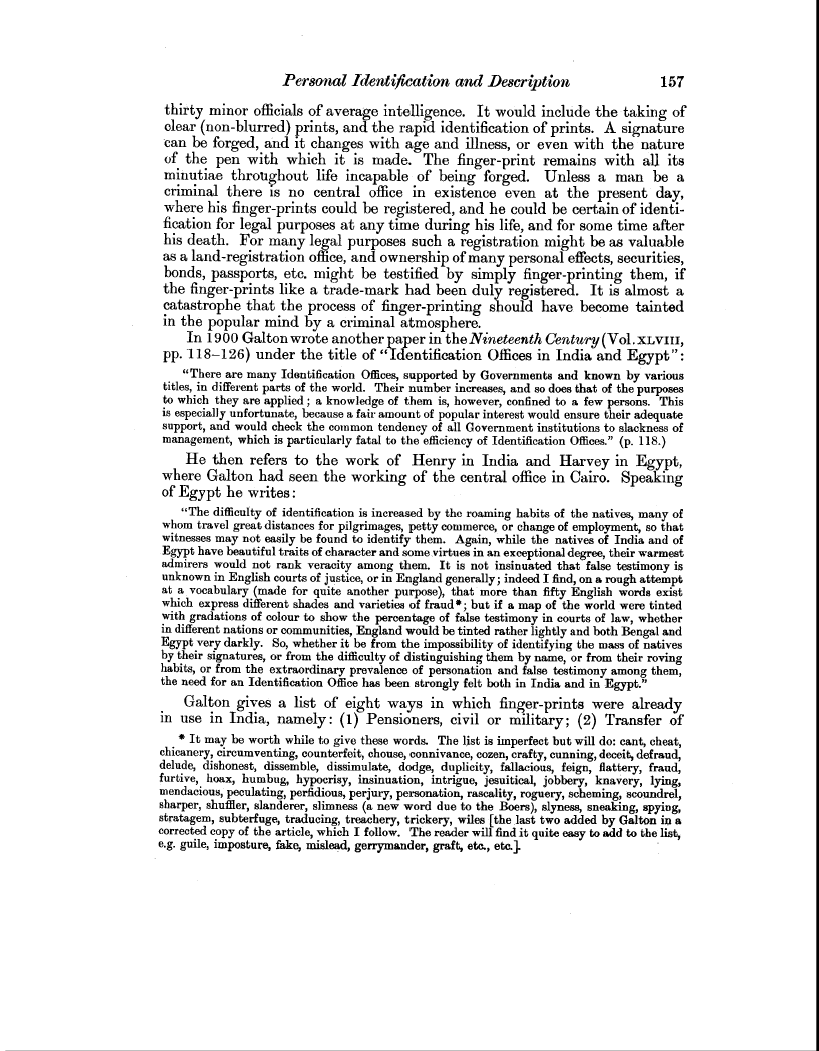| ||||||

OCR Rendition - approximate
Personal Identification and Description 157 thirty minor officials of average intelligence. It would include the taking of clear (non-blurred) prints, and the rapid identification of prints. A signature can be forged, and it changes with age and illness, or even with the nature of the pen with which it is made. The finger-print remains with all its minutiae throughout life incapable of being forged. Unless a man be a criminal there is no central office in existence even at the present day, where his finger-prints could be registered, and he could be certain of identification for legal purposes at any time during his life, and for some time after his death. For many legal purposes such a registration might be as valuable as a land-registration office, and ownership of many personal effects, securities, bonds, passports, etc. might be testified by simply finger-printing them, if the finger-prints like a trade-mark had been duly registered. It is almost a catastrophe that the process of finger-printing should have become tainted in the popular mind by a criminal atmosphere. In 1900 Galton wrote another paper in the Nineteenth Century (Vol. XLVIII, pp. '118-126) under the title of "Identification Offices in India and Egypt" "There are many Identification Offices, supported by Governments and known by various titles, in different parts of the world. Their number increases, and so does that of the purposes to which they are applied ; a knowledge of them is, however, confined to a few persons. This is especially unfortunate, because a fair amount of popular interest would ensure their adequate support, and would check the common tendency of all Government institutions to slackness of management, which is particularly fatal to the efficiency of Identification Offices." (p. 118.) He then refers to the work of Henry in India and Harvey in Egypt, where Galton had seen the working of the central office in Cairo. Speaking of Egypt he writes "The difficulty of identification is increased by the roaming habits of the natives, many of whom travel great distances for pilgrimages, petty commerce, or change of employment, so that witnesses may not easily be found to identify them. Again, while the natives of India and of Egypt have beautiful traits of character and some, virtues in an exceptional degree, their warmest admirers would not rank veracity among them. It is not insinuated that false testimony is unknown in English courts of justice, or in England generally; indeed I find, on a rough attempt at a vocabulary (made for quite another purpose), that more than fifty English words exist which express different shades and varieties of fraud*; but if a map of the world were tinted with gradations of colour to show the percentage of false testimony in courts of law, whether in different nations or communities, England would be tinted rather lightly and both Bengal and Egypt very darkly. So, whether it be from the impossibility of identifying the mass of natives by their signatures, or from the difficulty of distinguishing them by name, or from their roving habits, or from the extraordinary prevalence of personation and false testimony among them, the need for an Identification Office has been strongly felt both in India and in Egypt." Galton gives a list of eight ways in which finger-prints were already in use in India, namely: (1) Pensioners, civil or military; (2) Transfer of * It may be worth while to give these words. The list is imperfect but will do: cant, cheat, chicanery, circumventing, counterfeit, chouse, connivance, cozen, crafty, cunning, deceit, defraud, delude, dishonest, dissemble, dissimulate, dodge, duplicity, fallacious, feign, flattery, fraud, furtive, hoax, humbug, hypocrisy, insinuation, intrigue, jesuitical, jobbery, knavery, lying, mendacious, peculating, perfidious, perjury, personation, rascality, roguery, scheming, scoundrel, sharper, shu$ler, slanderer, slimness (a new word due to the Boers), slyness, sneaking, spying, stratagem, subterfuge, traducing, treachery, trickery, wiles [the last two added by Galton in a corrected copy of the article, which I follow. The reader will find it quite easy to add to the list, e.g. guile, imposture, fake, mislead, gerrymander, graft, etc., etc.].
|